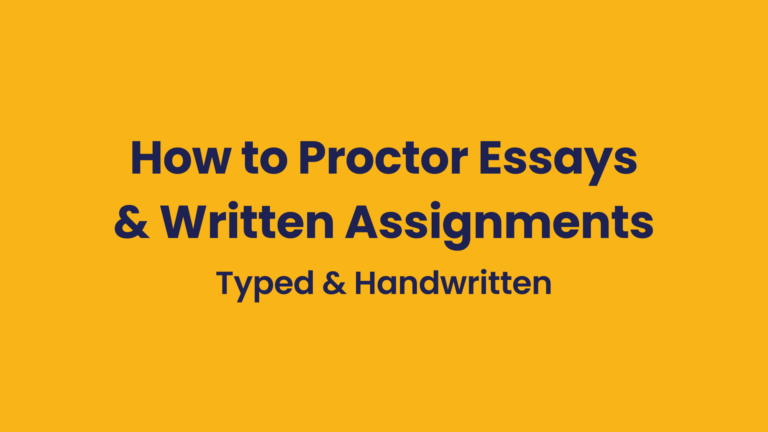Four ways faculty can help reduce test anxiety:
- Only apply test settings that you’re prepared to act on
- Explain how the proctoring solution works and what behaviors trigger flags
- Use practice exams and incentivize students to complete them
- Keep the big picture in mind when viewing proctoring results
Student test anxiety is a growing concern for many institutions as online learning and testing have become more common.
This growing concern is part of the reason that Honorlock and the University of North Alabama conducted a student test anxiety survey to learn:
- What causes test anxiety for students?
- Ways instructors can help students reduce test anxiety
- How online proctoring, such as Honorlock, can help reduce student test anxiety
See the full survey results, which show that online proctoring can help reduce student test anxiety. The tips below are provided by Jill Simpson, PhD, Assistant Professor & Instructional Technologist.
4 tips to reduce student test anxiety
1. Only apply settings that you’re prepared to act on
“It’s easy to turn on Honorlock online proctoring and use all the settings, but you may consider only applying settings that you’re ready to take action on,” Simpson said.
For example, if you want to allow students to use books during the exam, tell Honorlock proctors not to flag any books during the room scan. But you can still indicate that no other people can be in the room during the exam.
Another example is that you may want to allow students to use other applications on their devices, such as Microsoft Word for a written exam or Excel for an accounting exam. You can pick which sites and software to allow while blocking everything else. You can pick which sites and software to allow while blocking everything else. This approach allows you to assess students in different ways beyond traditional question formats.
2. Tell students what actions can trigger flags
“We prepare students ahead of time by giving them an orientation at the beginning of the program with a module dedicated to online proctoring with Honorlock,” Simpson explained.
This provides students with practical information about how online proctoring works, what behaviors are typically flagged, technical requirements, and a practice test. Simpson also provides students with additional online proctoring information and resources, which include information about how to prepare for a proctored exam and what to expect, test-taking strategies, and privacy information.
“Let students know your test rules and policies and tell them what can trigger a flag. Tell students that if something does get flagged… don’t panic because the Honorlock test proctor is there to help you and answer your questions.”
Training our test proctors a better way
Honorlock’s full-time proctoring team was trained by a nationally certified counselor and educator on support during moments of testing anxiety and frustration to assist students and help them feel supported.
3. Provide a practice exam with an incentive to complete it
“You need to make sure that students are comfortable going into their exams. The more practice students have, the better they’ll be with it,” Simpson said.
Be sure to encourage faculty to always offer a practice exam with an incentive to take it, such as giving credit for the practice exam.
Use practice exams that mimic real exams
“Honorlock provides a practice exam to use, but you can build your own practice exam that mimics your actual exam. This helps students know what to expect with online proctoring,” Simpson said.
The practice exam doesn’t have to include exact questions that will be on actual exams, but the questions could be similar, and you should also include the different question types you plan to use, such as multiple-choice, true or false, and written responses.
“My professor set up a practice test the week before the first real test. The practice test listed out all of her expectations and requirements. On my first real exam, I was fully prepared for the online proctoring experience since I knew what to expect.” – Student quote in a post-exam student test anxiety survey interview
Don’t forget practice exams with third-party software
“Practice exams are especially important if you’re using third-party software, which can be different from the LMS,” Simpson noted.
By allowing a practice test using each third-party software, such as Pearson, McGraw-Hill, and MyMathLab, students will know what to expect and won’t panic when they encounter it before a real exam.
4. Keep the big picture in mind when reviewing results
“Try to look at the big picture when you review results from the proctored exam,” Simpson said.
The bigger picture means evaluating the student’s behavior as a whole during the entire proctored exam.
“If the student hasn’t had many flags over the exam, be willing to believe that one single flag may have been an honest mistake,” Simpson said.
“Maybe the student did a room scan and showed the entire room but missed a part of their desk – it could have been an honest mistake. If they didn’t have many behavior flags during the exam, I’m not going to penalize them, but I’ll reach out to them to remind them what to do next time.”
Simpson explained that the opposite situation could also occur, “If I had a student who didn’t show the room entirely and also had multiple flags for other behavior, such as going off camera for a significant amount of time or often looking away from the computer, that could look suspicious and should be addressed.”
Students should also understand this review approach. They need to know that they don’t have to worry about every action being flagged by the online proctoring software, and that even if there are flags, they’re evaluated from a broader perspective. This approach to proctoring online exams can help reduce student test anxiety and the stress that students experience.
Student test anxiety survey findings summary
Who was surveyed?
UNA students were surveyed before and after exams to understand their baseline anxiety regarding proctored online exams.
Survey findings:
3 main causes of student test anxiety:
- Technology concerns (worried their device won’t work or Internet connection)
- Students don’t understand what can be flagged by online proctoring software or live proctors
- Students don’t know how interactions with a test proctor will go
Honorlock’s approach to online proctoring helped reduce student test anxiety
The test anxiety survey results found:
- 6% decrease in student test anxiety between their first and second exams
- 15% decrease in test anxiety associated with the statement, “Thoughts about the proctor interfered with my concentration.”
- 100% of students who interacted with an Honorlock test proctor responded “Yes” to the interview question “Did the proctor make you less anxious?”
Here are some quotes from another survey of over 1,500 students at Coastal Alabama Community College.
These quotes emphasize how the right type of proctoring can improve the testing experience and even help students focus and perform better on their exams. Read the full case study.
- “Honorlock is very easy to use and it’s not a hassle.”
- “Honorlock is user-friendly, easy to use, and works quickly.”
- “It pops up whenever I need to use it so I don’t have to manually do anything.”
- “Honorlock doesn’t lock you out if you make a small noise like other programs do.”
- “I like that Honorlock provides flexibility for when I lose internet during a test.”
- “With Honorlock, I can’t cheat. Therefore, I have to push myself to learn.”
- “Honorlock keeps me focused on my work.”
- “Honorlock challenges you to really try your best.”
- “Honorlock keeps me focused and not think about distractions.”
- “Honorlock keeps me in the right head space.”
- “Honorlock keeps me focused on finishing the test.”
- “I like how private Honorlock is. It gives students the feeling of being alone and gets them in the right mindset to take a test.”
- “Honorlock helps me focus more and reduces the urge to cheat on things.”
- “If something goes wrong with my test or internet, Honorlock support is always
there to help.” - “Support was so helpful when I had an issue during an exam. He didn’t stop until
it was working.” - “It was easy to reach out for support using chat.”
- “Live agents are always available for any questions or concerns during test time.”
- “I like that you can talk one-on-one with an actual person if anything goes wrong.”
- “I like how Honorlock troubleshoots with you right then and there.”
“Honorlock has assistance to help you with any problem that may occur.”
“Honorlock was fast at fixing a problem for me.”
- “I like that I don’t have to schedule the test and that I can take tests at any time.”
- “I like the flexibility to take a test on my schedule.”
- “Honorlock saves me gas money.”
- “I like to be able to take exams home when needed.”
- “It’s flexible. It’s nice being able to take tests at my convenience.”
- “With Honorlock, I know that all students are on an even playing field.”
“Honorlock makes you accountable for actually learning the material, not just cheating your way through.” - “It reassures me that everyone is taking the tests fairly because it is very hard to cheat with Honorlock.”
- “I know I can take my tests without worrying about others cheating and that they have to try as hard as me to succeed.”
- “I like how I can prove that I’m doing my own work with Honorlock.”
- “Honorlock is secure, unlike some other proctoring services.”
- “I like the fact that Honorlock helps students remain accountable for doing
their own work.” - “Honorlock keeps students honest in their test taking.”
- “I felt good that my test was secure with Honorlock.”
- “Honorlock proves to your instructor that you are not cheating, even if they think that you are.”
- “On Honorlock, you can prove that you did not cheat on a test so the teacher does not think you are lying.”
- “I like that there is no way to cheat with Honorlock.”
- “I like that Honorlock made sure I wasn’t cheating.”
The Honorlock Difference
Honorlock’s approach to online proctoring benefits the institution and the learner.
Our purpose isn’t to simply catch students who are cheating – we strive to create a better online testing experience that supports faculty and students while protecting your exams and reputation. Choose online exam proctoring with integrity and humanity.








